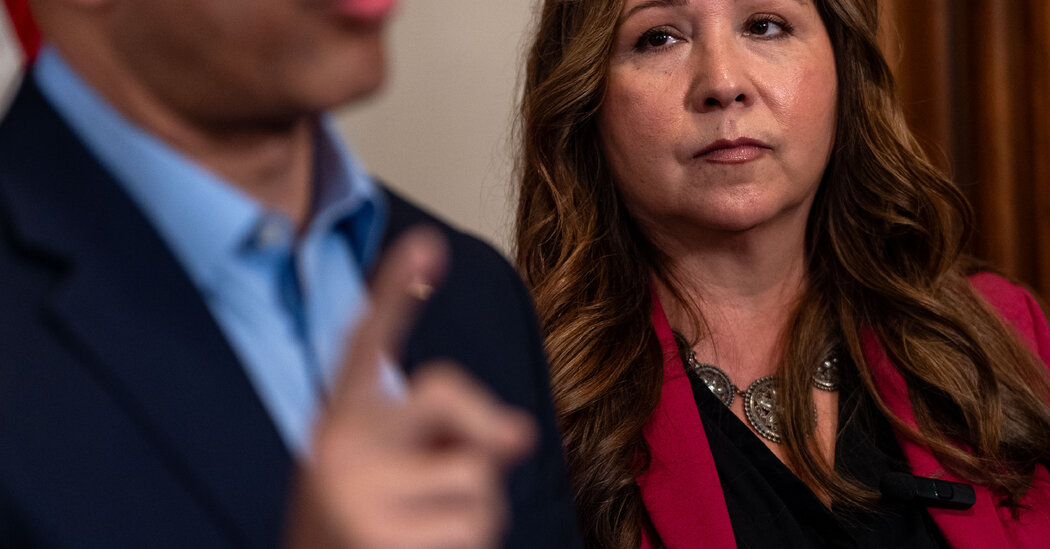Just moments after being sworn in to office on Wednesday, Representative Adelita Grijalva, Democrat of Arizona, provided the final signature needed on a petition to force a House vote on releasing the Trump administration’s investigative files on the convicted sex offender Jeffrey Epstein.
Speaker Mike Johnson had refused for more than seven weeks to seat Ms. Grijalva after she won a special election in September, a delay she attributed to his efforts to avoid a vote on the Epstein files, a charge the speaker denied.
In a speech after taking her oath, Ms. Grijalva called Mr. Johnson’s tactic “an abuse of power,” and criticized Republicans for their handling of the Epstein matter. “The majority of this body has failed,” she said, to hold the Trump administration accountable.
Then, in her first act as a representative, she provided the 218th and final signature on a petition demanding a vote on a resolution directing the Justice Department to release all of its Epstein files. Her signature started the clock on a vote now on schedule to occur in early December, on a matter that has caused a major rift among Republicans.
Even if the bill were to pass the House, it would need to be approved by the Republican-controlled Senate, where there is no guarantee that it would get a vote. And should it reach President Trump’s desk, he would be all but certain to veto it.
Still, Mr. Trump has undertaken an uncommonly intense lobbying effort to head off a House vote on the matter, which would put Republicans in an uncomfortable spot: torn between their loyalty to the president and their constituents’ calls for full transparency about the Epstein investigation.
The petition reached its threshold for action just as Democrats on the House Oversight Committee revived the debate over the Trump administration’s handling of the Epstein files, by releasing three emails in which Mr. Epstein suggested that Mr. Trump knew more about Mr. Epstein’s abuse than he had previously acknowledged.
Republican leaders will have time to weigh whether to try to quash the petition, including by sidelining it by turning to the influential Rules Committee. Still, Mr. Johnson said last month that he would not prevent a vote on the measure, making it increasingly likely that congressional Republicans will be forced to confront a difficult vote that their leaders had hoped to avoid.
After Trump administration officials promised to make public investigative files on Mr. Epstein, the disgraced financier who died in federal custody in 2019 while facing sex-trafficking charges, they suddenly backtracked in July and closed their investigation without providing new revelations.
The reversal angered many of Mr. Trump’s right-wing supporters, who made their displeasure known to members of Congress.
Representatives Thomas Massie, the Kentucky Republican who is a frequent critic of Mr. Trump, and Ro Khanna, Democrat of California, months ago began an effort to force a vote to demand the Trump administration release the Epstein files within 30 days.
House rules allow members to bypass committees and leaders and send legislation straight to the floor if a majority of 218 lawmakers demand it through a maneuver known as a discharge petition.
Because Republicans hold a slim majority in the House, only a few of them needed to join Democrats in order for the maneuver to succeed.
But in the face of vocal opposition from Mr. Trump, who has dismissed continued concern as a “Democratic hoax,” the maneuver stalled. Just three Republicans joined Mr. Massie’s effort: Representatives Marjorie Taylor Greene of Georgia, Nancy Mace of South Carolina and Lauren Boebert of Colorado.
With that maneuver no longer an option, lawmakers were left waiting for Democrats to win special elections in order to reach the threshold for action.
Before her election, Ms. Grijalva had said she would sign the petition once elected. But when she took office, the House was in the middle of an indefinite hiatus that Mr. Johnson called during the government shutdown in an effort to force Senate Democrats to accept Republicans’ proposal to fund the government.
On Wednesday, she said she had invited two victims of Mr. Epstein’s sex-abuse operation, Elizabeth Stein and Jessica Michaels, to sit in the House gallery to watch her be sworn in.
Under the rules that govern a discharge petition, once the petition reaches the requisite 218-signature threshold, it cannot be acted upon until after seven legislative days when the House is in session for regular business. That period, which does not match with calendar days, is known as a “ripening period.”
As the schedule stands, representatives will return next week for five days, leave for Thanksgiving and return in December.
Once the discharge petition ripens, a member must step on the House floor and announce that they plan to call up the measure. Then, Mr. Johnson would have up to two legislative days to schedule a vote.
Michael Gold covers Congress for The Times, with a focus on immigration policy and congressional oversight.
The post Grijalva Signs Epstein Petition, Starting Clock Toward a Vote appeared first on New York Times.




